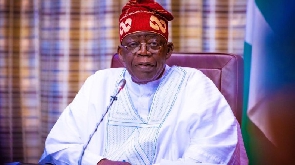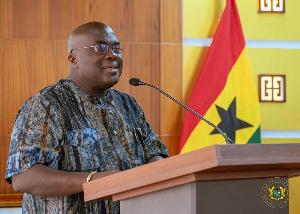Akua Bonsu
When it comes to eating, there are two types of people; those who took part in the preparation of the food, and those who linger around until the food is finished. The irony is that the latter group can be so overbearing after the food has been prepared that one often wonders where they were during the preparation of the food. Not only are they not ashamed to emerge only after the food has been prepared, they sometimes have the audacity to dictate who gets to eat what. Have I lost you yet?
Let’s go back to the 1980’s. Tsatsu Tsikata was handed a brand new agency called Ghana National Petroleum Corporation (GNPC) to manage. Give credit where credit is due; the agency laid out the academic work for oil exploration in Ghana. But that is where it stopped. For well over 15 years, actual discovery of oil in commercial quantities continued to elude Ghana. The reasons are not farfetched. The same tyrannical tactics; Tsikata’s penchant to micro-manage such that nothing moves at GNPC unless he has the final say so; lack of vision; and the inability to accurately determine what’s real and what’s a dream; all contributed to serious oil explorers staying away from Ghana.
The truth of the matter was that unbeknownst to all of us, Ghana was in fact sitting on oil. But with neither the technological ware withal nor the financial resource, Ghana was essentially like the guy who owns a large stretch of land but with no money to develop it. Developers are just not going to succumb to unreasonable dictation; they would rather take their money somewhere else. And so the beat went on…..
Enter the NPP and Kufuor administration in 2001. Just as President Kufuor was not bashful in accepting the HIPC status for Ghana, he also knew that unless the oil industry was made more attractive for investors, no one in his right mind would want to invest in what amounted to, say, timber on a desert. In short, the Kufuor administration made the necessary overtures in the international arena for investors to see Ghana as business-friendly. Thus, when investors were approached to invest in oil in Ghana, the new business-friendly environment lessened the risk to a certain measure. Even then, the big prospectors stayed away.
The story would be told as to how Dallas-based Kosmos Energy was convinced to reluctantly take a chance on Ghana and what personal sacrifices went into the arrangements that attracted them. The prospect of oil off the shores of Ghana was so faint that Kosmos’ posture was akin to doing the nation a favor. Let’s face it, if you had the money to invest in oil prospecting, why would you go to Ghana when there are several proven parts of the world that provides a more assured potential? Thus the old investing rule of high-returns-for-high-risk characterized the entire Kosmos experience in Ghana.
Today that experience is quickly turning into a nightmare. Its oil exploration deal that was subjected to a rigorous established evaluation including Cabinet, Parliamentary, and Council of State approval has had to endure ten months of cynical reevaluation under the NDC that turned up nothing inappropriate. When Kosmos decided that it would sell of its stake, for the better part of three months, no company met the barometer except oil giant ExxonMobil. In fact, some in the corridors at The Castle were literally jumping for joy that the almighty of oil production has expressed interest in Ghana, and is making an active bid to secure a stake in our nation’s budding industry. Then Mabey and Johnson hit with a bang!
Until Mabey and Johnson, many in the NDC administration had all but forgotten that the Foreign Corrupt Practices Act (FCPA) barred any American company doing business abroad to engage in bribery and corruption. Thus the expectation was that ExxonMobil, as big as they are, would not mind greasing a few palms to make the Kosmos deal a reality. With Mabey and Johnson causing a messy stir, the last thing anyone in the NDC wanted was another western company securing a deal in Ghana. Even if they were willing to grease some palms, they are sure to leave some kind of paper trail.
Well, when in a quagmire, call on the Chinese. They understand African business as well as Africans themselves. In fact, a close friend once recounted how his group of American investors saw the Chinese scoop a deal right before their eyes because, while the FPCA hindered them from indulging in any questionable payments, the Chinese had no such impediment. The NDC has no plans of having to deal with another Mabey and Johnson so the Chinese provide the best scenario. That is why it makes sense for the NDC administration to favor the Chinese over the Americans. But this is where the dishonesty begins and the danger follows.
Tsatsi Tsikata’s return to GNPC was assured when the NDC was declared winners of last year’s elections. This time, however, his role is unofficial. But you could not tell from the way he parades himself around Houston, Texas, the energy capital of the world as the so-called “go to” person for all things oil in Ghana. In fact, Tsikata actively pursued ExxonMobil to come to Ghana. Why is he now doing an about-face to favor the Chinese who did not even have a competing offer until late in the game? Why is the administration so reluctant to do business with an American company that has more than proven itself in oil production, but is moving heaven and earth to hand Ghana’s oil to an unproven Chinese entity?
This is where the lazy eater syndrome comes in. Tsikata had 19 years to deliver oil in commercial quantities to Ghana and he failed. The Chinese were brought in during the prospecting stage and they run away because they were an unwilling and incapable partner when their involvement would have amounted to a rolling of the dice. Today this duo wants to dominate Ghana’s oil? The fact remains that NPP found the oil, but the reality is that the NDC is running the affairs of our nation because of our collective adherence to democracy. But that should not give them the latitude to undo just about everything the NPP administration did. That should not mean they should dictate in such vehement and unreasonable manner, even at the risk of destroying our budding oil industry, as to who gets to produce our oil. ExxonMobil is a proven player, and it is seeking to acquire Kosmos’ stake in a fair and transparent way. It is high time Tsikata stepped aside and allowed reasonable minds to manage our oil.
Opinions of Monday, 19 October 2009
Columnist: Bonsu, Akua














